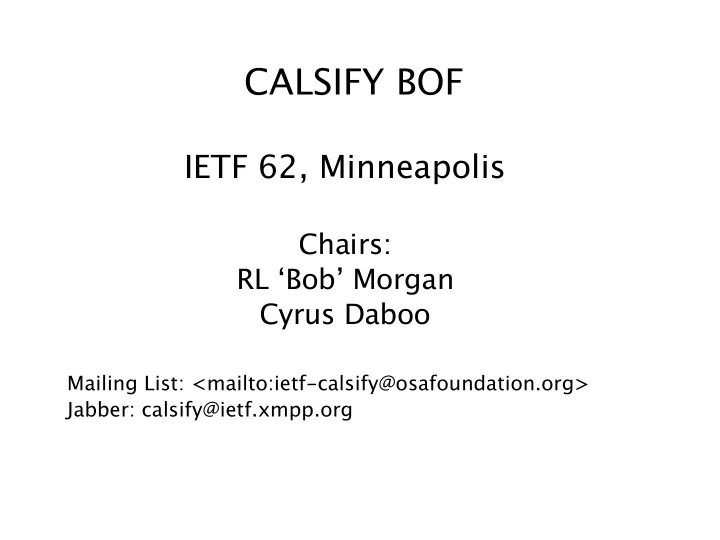

CALSIFY BOF IETF 62, Minneapolis Chairs: RL ‘Bob’ Morgan Cyrus Daboo Mailing List: <mailto:ietf-calsify@osafoundation.org> Jabber: calsify@ietf.xmpp.org
Agenda • Introduction (blue sheets, scribe) (2 min) • Agenda bashing (3 min) • Introduction (10 min) • Problem definition (45 min) • Possible solutions (30 min) • Next steps/WG charter (30 min)
Introduction #1 • Calendaring & Scheduling currently defined by: – RFC 2445 (iCalendar) (Nov 1998) – RFC 2446 (iTIP) – RFC 2447 (iMIP) • Also – RFC 3283 (Guide to Calendaring) (June 2002)
Introduction #2 • Other work has also been attempted, e.g: – iRIP - realtime server-to-server scheduling – CAP - access protocol • Other work based on iCalendar: – XML iCalendar syntax – RDF calendar work in W3C – Skical – CalDAV & GroupDAV- new WebDAV-based access protocols
Introduction #3 To date there are numerous implementations of iCalendar and iTIP, iMIP. There are also many implementations still using the older vCalendar format. There are several proprietary access protocols in use (e.g. Exchange, Notes, Oracle Calendar etc). Of course there are several non-iCalendar based implementations too.
Why make changes now? • End users want an interoperable solution for calendaring and scheduling. • Thus vendors are under pressure to deliver on that. • The Calendaring & Scheduling Consortium (“Calconnect”) has been setup to help achieve that by bringing together both users and vendors. • There are many more up and coming iCalendar products in the works.
Calconnect Consortium • <http://www.calconnect.org> • Promote Calendaring & Scheduling. • Interoperability testing and Certification. • Promote design & implementation of Calendaring & Scheduling Standards and implementations. • Promote collaboration among members. • Support common goals of members. • Develop a shared vision for the Calendaring & Scheduling community. • NB: Won’t write standards, instead: – Promote use of current and new standards to vendor, corporate and educational communities – Influence how standards evolve – Influence vendors to implement the standards Material extracted from calconnect.org overview presentation
Technical Committees TC-CalDAV TC-Calsify TC-EVENTPUB Define problems Support CalSIFY effort in Define event publishing CalConnect wishes to IETF to develop revisions & establish differences solve with extensions to of iCAL and related from regular calendaring WebDAV; assist IETF specifications and and scheduling with development of progress to standards CalDAV Specification TC-IOP/TEST TC-Min-IOP TC-REALTIME Support interoperability Determine & establish the Clarify issues involved testing for all technical minimum interoperable with realtime server-to- committees, develop subset of iCAL as an server calendaring and test suites & reference empirical approach to scheduling issues & implementation, publish determining the contents provide interop results of a revised iCAL recommendations specification TC-RECURR TC-TIMEZONE TC-USECASE Review problems in Identify requirements for & Develop a set of real current alternative a strategy to establish a world use cases that can approaches towards global timezone reference be used to validate handling recurrences & available to CalDAV & identified functionality & recommend a preferred other calendaring and testing scenarios for approach or guidelines scheduling server existing & future C&S implementations implementations Material extracted from calconnect.org overview presentation
Some Specific Issues • As described in: draft-daboo-calsify- issues-00 • Interop event results (slide follows). • Recurrences (slide follows). • Timezones (slide follows). • Document errata. • i18n - add i18n considerations. • Security - more comprehensive analysis of calendaring spam (“scam”) potential.
Calconnect results summary – Example of recent calconnect interop results: Specification Items Supported Items Not Supported RFC2445 114 6 RFC2446 15 5 RFC2447 8 5 Source: <http://www.calconnect.org/interop/uc%20berkeley% 20interop%20testing.pdf>
Recurrences • Some implementations do not support all Byxxx items (e.g. BYSETPOS). • Exceptions to recurrences are not handled well, particularly in an iTIP context. • Confusion of meaning of RECURRENCE-ID when overriding recurrences.
Timezones • Implementations generate them in different ways, but with the same TZID. • They are required for recurrence rules spanning a DST boundary but not if using fixed recurrence dates.
Courses of action • Are we prepared to ‘break’ existing implementations. • What is in scope for changes and what is out of scope.
Possible Approaches #1 1. Fix known errata in the rfc's. 2. Fix ambiguities in the rfc's. 3. Redesign recurrences: 1. Simplify RRULEs etc by limiting the possible combinations of each and the set of BYxxx values that are supported in any one rule. 2. Disallow unbounded recurrences on timed events etc. 3. Disallow unbounded recurrences in all cases. 4. Remove EXRULEs. 5. Remove RRULEs and EXRULEs - only use dates. This has the side-effect of removing the need to specify timezones.
Possible Approaches #2 1. Revise the set of documents as follows: 1. 'iCalendar Syntax' document 2. 'Basic Calendaring with iCalendar' document 3. 'Scheduling operations with iCalendar' document 4. 'Scheduling via Email' document 2. Split 2445 into two: 1. 'Basic' document with a set of features that covers a minimum set of interoperable capabilities in calendaring e.g. draft-royer-ical-basic-02 2. 'Advanced' document with a set of features to cover more complex issues which are know to be problematic. 3. Split 2445 into several documents: 1. 'Core' syntax/semantics encompassing VEVENT component items only 2. other documents for syntax/semantics for other types of component VTODO, VJOURNAL etc.
Possible Approaches #3 1. Leave all features of 2445 and provide a document describing which parts of 2445 are known to work well with recommendations to use those only. 2. Completely rewrite semantics of calendaring and scheduling, with the possibility of changing the syntax to use XML.
What’s next Find WG chairs Create Charter & Work Items & Milestones Make WG request to IESG
Goals • Assess what interoperates now, advance that subset to draft standard • Document what is unsatisfactory • Consider upgrade/version/transition issues – Eg negotiation, file export • “draft standard” approach • Fix desired features that are fixable without ratholes • XML transformation of revised format • Clarify extension procedures (IANA etc)
Recommend
More recommend